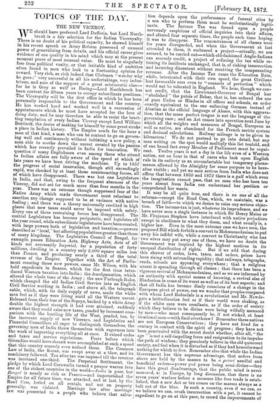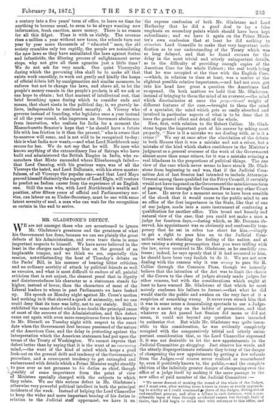TOPICS OF THE DAY.
THE NEW VICEROY.
and taxes and service regulations. Feats before which Girondins would have shrunk were accomplished at such a speed that this country scarcely even noticed them. The Common Law of India, the Koran, was swept away at a blow, and its machinery followed. Tax after tax was imposed till the revenue was increased one-third. The Perpetual Settlement, the pledge by which Lord Cornwallis turned a pauper warren into one of the richest countries in the world—India is poor, but Bengal is nearly as rich as France—and impoverished the Empire for all future time, was attacked, and at last, by the Road Cess, levied on all rentals, and not on property generally, was violated. Marriage law after marriage law was presented to a people who believe that salva- tion depends upon the performance of funeral rites by a son who to perform them must be ecclesiastically legiti- mate. The Income Tax was forced upon a people nervously suspicious of official inquiries into their affairs, and altered four separate times, the people each time hoping it was to disappear. The remonstrances of all classes were for years disregarded, and when the Government at last attended to them, it embraced a project—actually, we are assured, to be carried out—which old-fashioned Anglo-Indians can scarcely credit, a project of reducing the tax while re- taining its incidents unchanged, that is, of risking insurrection, and incurring discontent without receiving the compensating revenue. After the Income Tax came the Education Rate, while, intoxicated with their own speed, the great Civilians lent favourable ears even to "counsels of perfection" which would not be tolerated in England. We hear, though we can- not credit, that the Lieutenant-Governer of Bengal has " abolished " the patois of Behar, that is, has ordered the use of pure Urdoo or Hindee in all offices and schools, an order exactly equivalent to the one enforcing German instead of Alsatian as the official language of Alsace, with this aggrava- tion, that the more perfect tongue is not the language of the governing race ; and an Act comes into operation next June by which all the weights and measures of Bengal, European as well as native, are abandoned for the French metric system and decimal calculations. Railway mileage is to be given in kilometres ! We do not pretend to go into detail, but any man writing on the spot would multiply this list tenfold, and of one broad fact every Member of Parliament must be cogni- zant. Twelve years is not a day in the life even of a Western nation, not an hour in that of races who look upon English rule in its entirety as an uncomfortable but temporary pheno- menon allowed by the Almighty for some purpose to be here- after visible ; and yet no man arrives from India who does not affirm that between 1860 and 1872 there is a gulf which even the imagination cannot pass, that no man who has been ten years absent from India can understand her position or
comprehend her wants. -
It may be all quite true, and there is no one of all the reforms—except the Road Cess, which, we maintain, was a breach of faith—to which we desire to raise any serious objec- tion. The income-tax is just, whatever its imprudence, and we have never seen a single instance in which Sir Henry Maine or Mr. Fitzjames Stephen have interfered with native prejudices, except in obedience to what they deem, and what usually is, a higher law. Even in the most extreme case we have seen, the proposed Bill which forbids a convert to Mohammedanism to put away his infidel wife, while a convert to Christianity who has two wives may put away one of them, we have no doubt the Government was inspired by the highest motives in its unequal distribution of rights. But if we add that during this shower of codes, laws, taxes, and orders, prices have. been rising with astounding rapidity; that railways, telegraphs, roads, schools are appearing everywhere ; that a religious unrest is spreading through all classes ; that there has been a vigorous revival of Mohammedanism, and as we are informed by an authority with special means of knowing, a revival also of Hindooism in some of its worst as well as of its best aspects; and that all India has become dimly conscious of a change in the European pivot of power, can we wonder that peoples compared with whom Lord Redesdale is a revolutionist and Mr. Newde- gate a latitudinarian feel as if their world were shaking, as if the white men were assailants, as if the order of society which they believe to be divine were being wilfully menaced by men—who must consequently be, if not wicked, at least irrational men—with final overthrow? Remember these natives are not European Conservatives ; they have not lived for a century in contact with the spirit of progress ; they have not been penetrated with the secret doubt whether, after all, "the age" is not a self-impelling force and resignation to its impulse the path of wisdom; they genuinely believe in the old quiescent society, and feel when it is disturbed as if they had henceforward nothing for which to live. Remember also that while the Indian Government has this supreme advantage, that orders from above are held by the masses to be a priori needful and beneficial orders—power pal power being semi-divine—they have this great disadvantage, that the public mind is never manured, as in Europe, by long discussion, that there is no seven years' warfare before a measure like free trade is estab- lished, that a new Act or tax comes on the masses always as a bolt out of the blue. In such a country, even if we can, as we believe we can, crush insurrection with a pat, it cannot be expedient to go on at this pace, to crowd the improvements of a century into a five years' term of office, to leave no time for anything to become usual, to seem to be always wanting new information, fresh exertion, more money. There is no reason for all this fidget. Time is with us visibly. The revenue rises a million a year without new taxes, the schools turn out year by year more thousands of " educated " men, the old society crumbles only too rapidly, the people are assimilating the now laws as they have assimilated the laws against Suttee and infanticide, the filtering process of enlightenment never stops, why not give all these agencies just a little time ? We do not ask for very much. One quiet Viceroyalty during which the governing idea shall be to make all that exists work smoothly, to work out gently and kindly the heaps of official debris left by amalgamation and similar measures, to enforce but not to change the laws, and above all, to let the people's money remain in the people's pockets, is all we ask or can hope to obtain ; but that amount of intellectual rest, that brief breathing space during which to consider ends and means, that short siesta in the political day, is, we gravely be- lieve, indispensable to continued security. A Viceroy who governs instead of founding, who legislates once a year instead of all the year round, who impresses on Governors abstinence from innovation, who realizes for India for a moment the Massachusetts Senator's hope that "he should have a future life with less friction in it than the present," who is aware that to-morrow will come, and is not wild to be recognized to-day; this is what India now wants,—and what Lord Northbrook may secure for her. We do not say that he will. No man who knows anything of the extraordinary line of Satraps who have built and administered the British Empire in India, who re- members that Minto succeeded where Ellenborough failed— that Lord Canning, with his gracious ways, was of all the Viceroys the hated, and Lord Dalhousie, with his stern master- fulness, of all Viceroys the popular one—and that Lord Mayo proved himself distinotlythe superior of Lord Elgin, will venture to predict an Indian career from the experience of an English one. Still the man who, with Lord Northbrook's wealth and position, after fifteen years of official and Parliamentary ser- vice, can labour on as Under-Secretary, must be one with some latent serenity of soul, a man who can wait for the recognition so certain in the end to arrive.



































 Previous page
Previous page